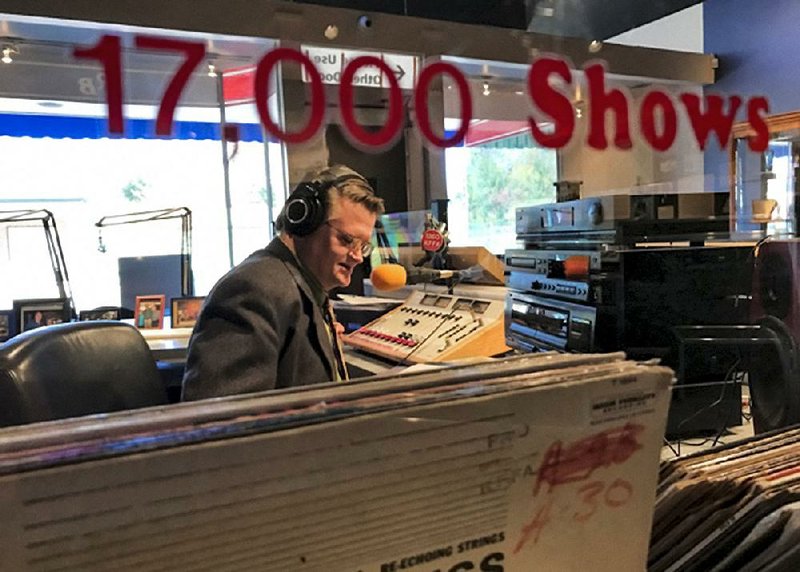HELENA-WEST HELENA -- The internationally known radio program King Biscuit Time turned 75 years old on Monday with a guest host, no studio audience and a seven-song playlist that paid homage to the pioneering blues musicians who leveraged a 15-minute show into careers that influenced music across the world.
Thomas Jacques, assistant director of the Delta Cultural Center, hosted the 17,584th broadcast of King Biscuit Time, said to be the longest-running daily blues radio program in the country. Jacques has been filling in for Blues Hall of Fame Foundation inductee "Sunshine" Sonny Payne, who said in a telephone interview Monday that he plans to return to the air today after a brief hospital stay.
Payne will turn 91 on Nov. 29, and the Delta Cultural Center plans to celebrate both Payne's birthday and the show's anniversary that day. As always, the public is invited to the studio, tucked into an exhibit hall at the cultural center's Cherry Street museum.
The program is broadcast from the museum, but it has always been carried by KFFA-AM, which started Nov. 19, 1941, two days before the radio program. That will change soon.
KFFA owner Jim Howe sold the station Friday to Texas-based High Plains Radio Network, which has been buying radio stations in the the Delta region with hopes that their agriculture-focused programming will find a wider audience. The company's president said King Biscuit Time would "absolutely continue" and that he hoped to expand its reach through syndication.
"We're proud at the Delta Cultural Center to host King Biscuit Time, as we have since the 1990s, at our museum," Jacques said. "We hope to continue that for the foreseeable future. It is a huge drawing point for blues and music fans across the country and internationally, as well. It helps us tell that story, one aspect of the Delta."
The Delta Cultural Center, part of the Department of Arkansas Heritage, allows visitors to watch Payne host the weekday shows, which are uploaded daily to KFFA's website. The center is technically closed on Mondays, but it's a lightly held secret that listeners can gain access by knocking on the studio door, Jacques said.
A visitors log near the radio booth shows guests from England, Australia, Germany, Canada, Japan and elsewhere since October. The museum is one of the bright spots on Cherry Street in downtown Helena-West Helena, where old and new businesses are interspersed between abandoned and crumbling historic buildings.
Though it eventually expanded from 15 minutes to a half-hour in length, King Biscuit Time has always begun at 12:15 p.m., which gave field workers time to wash their hands, grab a plate of food and gather near a radio to tune into one of the first radio shows specifically designed for a black audience, Jacques said.
When Sonny Boy Williamson, Robert Lockwood Jr. and other local blues musicians founded the show in 1941, the performances were live and the radio show was their way to advertise performances at juke joints throughout the Delta.
Interstate Grocery Co., distributor of King Biscuit flour, sponsored the program. Sacks of flour and, later, Sonny Boy-branded cornmeal would be set up on the stage of their live performances as the show's popularity skyrocketed.
"I didn't know what the hell they were playing, but I enjoyed it," said 76-year-old Bubba Sullivan, co-founder of the King Biscuit Blues Festival who also owns Bubba's Blues Corner, a record store, on Cherry Street.
But as beloved as the show was locally, the musicians garnered most of their success when they left the South. They enthused fans in Europe and Chicago, and the sound can be found interwoven into the popular music that followed, including modern rock, hip-hop and pop.
The music, however, was about songwriters expressing specific messages, Payne said.
"What they're doing, years ago, the black man couldn't get out on the street and say anything to the white man," Payne said. "They said, 'Oh I don't have time to hear you boy, I'm busy.'
"So they sing about it. Every damn song they sing was a song delivering a message to the white people, and they didn't know it. That's the truth. Since you didn't want to hear them, they would sing it to you. That's the way they got their message across."
Most of the musicians, who didn't understand contracts, didn't earn the money they deserved, Sullivan said.
"The damn guys that laid the groundwork for [rock 'n' roll stars], they just died, broke," Sullivan said.
Interstate Grocery shut down in 1981 and the show went off-air for five years until KFFA's Howe revived it in 1986. Various advertisers have sponsored the show since.
Jacques on Monday played songs by Williamson, Lockwood, James "Peck" Curtis, Robert "Dudlow" Taylor, Houston Stackhouse, Pinetop Perkins and Joe Willie Wilkins, all of whom performed live in the show's early days.
Payne, who earned a job at the radio station after its Nov. 19, 1941, founding, hosted his first show in July 1942. He left Helena that December after entering the service. Payne returned in 1950 and has been hosting the program.
Payne said listeners today continue to learn from music they either haven't heard or are listening to for the first time in a long time, similar to the way the appreciation of older-model cars grows as time passes. People still request specific songs, almost daily.
But 75 years later, the spontaneity and liveliness of Delta blues performances are missing.
"It's not the same as when we had them all together," Payne said. "That's when you really had the real stuff. We've got, now, CDs, but it's just not the same. We try to make it the same. That's what we're paid to do. That's what our sponsors pay us to do."
State Desk on 11/22/2016

